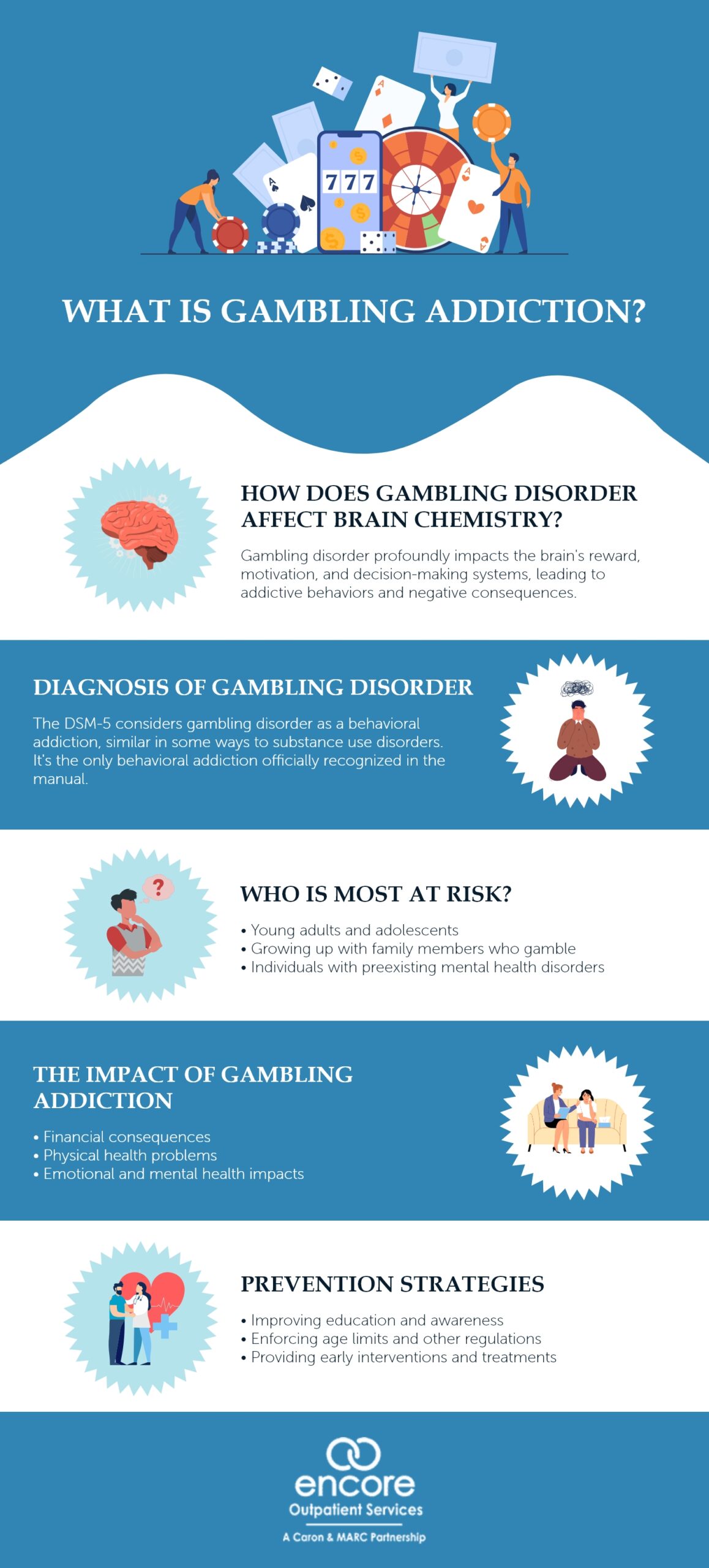Gambling addiction, also known as compulsive gambling or gambling disorder, is a serious mental health condition that affects millions of people worldwide. It involves an uncontrollable urge to gamble despite negative consequences. This leads to significant disruptions in personal, professional, and financial aspects of life.
Understanding the true nature of gambling addiction is the first step in recognizing and addressing this behavioral challenge.
How Does Gambling Disorder Affect Brain Chemistry?
Gambling disorder profoundly impacts the brain’s reward, motivation, and decision-making systems, leading to addictive behaviors and negative consequences.
When a person gambles, the brain releases dopamine, a neurotransmitter associated with pleasure and reward. This release creates a sense of euphoria and reinforces the behavior, encouraging repeated gambling.
Over time, individuals may develop a tolerance, needing to gamble more frequently or with higher stakes to achieve the same level of dopamine release. This destructive cycle can lead to changes in brain structure and function, particularly in areas related to decision-making, impulse control, and reward processing.
The prefrontal cortex, which is responsible for rational decision-making and impulse control, may also become less active, making it harder to resist the urge to gamble. This imbalance between the brain’s reward system and impulse control mechanisms contributes to the compulsive behaviors seen in gambling disorder.
Understanding these changes in brain chemistry helps explain why gambling disorders can be challenging to overcome and highlights the need for effective treatment strategies.

Diagnosis of Gambling Disorder
According to the American Psychiatric Association (APA), the DSM-5 considers gambling disorder as a behavioral addiction, similar in some ways to substance use disorders. It’s the only behavioral addiction officially recognized in the manual.
A diagnosis of gambling disorder requires at least four of the following criteria within a 12-month period:
- Needing to gamble with increasing amounts of money to achieve the desired excitement.
- Restlessness or irritability when attempting to cut down or stop gambling.
- Repeated unsuccessful efforts to control, cut back, or stop gambling.
- Preoccupation with gambling (reliving past gambling experiences, planning the next venture, thinking of ways to get money to gamble).
- Using gambling as a way to escape from problems or relieve feelings of helplessness, guilt, anxiety, or depression.
- Chasing losses (returning to gamble after losing money to recoup losses).
- Lying to conceal the extent of involvement with gambling.
- Jeopardizing or losing important relationships, jobs, or educational or career opportunities because of gambling.
- Relying on others to provide money to relieve desperate financial situations caused by gambling.
Understanding these signs can aid in identifying a gambling addiction and seeking appropriate help.
Types of Gamblers and Their Risk of Addiction
Here’s a list of different types of gamblers and their risk of developing a gambling addiction:
- Casual Gamblers: Participate in gambling occasionally and without a regular pattern, primarily for fun.
- Risk of Addiction: Low to moderate. They may develop problematic behavior if exposed to high-risk situations.
- Serious Social Gamblers: Treat gambling as a primary hobby, investing significant time and money.
- Risk of Addiction: Moderate. They are at a higher risk if they start to lose control or begin chasing losses.
- Professional Gamblers: Make a living from gambling with a strategic and disciplined approach.
- Risk of Addiction: Low to moderate. While methodical, they may still face addiction risks, especially if they gamble outside their professional activities.
- Problem Gamblers: Experience difficulty controlling their gambling behavior, leading to negative consequences.
- Risk of Addiction: High. They are on the verge of developing or have already developed an addiction, affecting various aspects of their lives.
- Pathological Gamblers: Suffer from a severe form of gambling addiction with an uncontrollable urge to gamble despite significant negative impacts.
- Risk of Addiction: Very high. They require professional treatment to overcome their addiction, as it severely disrupts their personal, professional, and financial lives.
Understanding the types and risk levels helps in identifying potential problems early and taking appropriate measures to prevent or address gambling addiction.
The Rise of Problem Gambling
Gambling is widely regarded as a fun and socially acceptable recreational activity. However, there is a fine line between recreational gambling and compulsive gambling.
According to The Yale Ledger, 96% to 98% of individuals fall into the recreational gambling or social gambling category. Individuals who engage in recreational gambling primarily do it for fun, excitement, social interaction, and the challenge of skill-based games.
In contrast, problem or pathological gamblers exhibit addictive behaviors and gamble at a greater frequency. They generally gamble at casinos, play the lottery, and gamble online. According to a recent report published by the National Library of Medicine (NIM), pathological gambling affects around 2.9% of the adult population.
While the prevalence of problem or compulsive gambling is far lower than that of recreational gambling, gambling behaviors seem to be increasing significantly among certain demographics.
Since the legalization of sports betting in many states and targeted marketing by the industry, expanded access to gambling opportunities has led to concerning gambling trends. This trend highlights the need for enhanced prevention and professional treatment efforts.
Who Is Most at Risk?
Certain groups are more vulnerable to developing a gambling addiction due to various risk factors. These include:
- Young Adults and Adolescents: Younger individuals are at a higher risk due to their developmental stage and greater propensity for risk-taking behaviors.
- Males: While both men and women can develop gambling problems, evidence indicates that gambling addiction is more prevalent among the male population.
- Family Influence: Growing up with family members who gamble heavily can normalize and reinforce gambling behaviors.
- Preexisting Mental Health Disorders: Individuals suffering from conditions such as depression, anxiety, or substance use disorders have an increased risk of developing gambling problems.
- Chronic Stress: Those experiencing significant stress or life changes may turn to gambling as a coping mechanism.
- Frequent Gamblers: Regular gamblers, especially those who start at a young age, are more susceptible to developing gambling addiction over time.
- Individuals with Financial Issues: People facing financial difficulties may see gambling as a way to solve their issues, increasing their risk of addiction.
Understanding these risk factors can help in identifying and supporting individuals who may be at higher risk of developing a gambling addiction.
The Impact of Gambling Addiction
Gambling addiction can have damaging effects on an individual’s finances, mental health, relationships, and overall quality of life.
- Financial Consequences: Severe debts, loss of property, and financial devastation are common consequences of gambling addiction.
- Emotional and Mental Health Impacts: Gambling addiction is linked to higher rates of depression, anxiety, stress, and other mental health conditions.
- Physical Health Problems: Lack of sleep, poor diet, and neglect of self-care can lead to physical health problems.
- Relationship Strain: The financial and emotional strain caused by compulsive gambling is a major source of conflict and tension in relationships.
- Work and Career Impact: Gambling addiction can severely impact an individual’s work performance, attendance, and ethical behavior, leading to reduced productivity, damaged relationships with coworkers, and even job loss.
- Legal Complications: Gambling addiction can drive individuals to engage in illegal activities that have serious legal ramifications.
- Risk of Suicide: Problem gamblers have a very high risk of attempting suicide, especially during the “desperation phase” of their addiction.
Understanding these impacts is crucial for recognizing the severity of gambling addiction and the importance of seeking help and support.
Stigma Surrounding Gambling Addiction
Gambling disorder is a diagnosable chronic mental health condition similar to substance use disorders. Despite this, it’s a topic that’s rarely discussed. While most people understand and sympathize with the struggles of drug and alcohol addiction, they often view gambling as a lesser evil. However, the symptoms of problem gambling and substance use disorders are very similar, with both associated with higher rates of depression, anxiety, and suicidal behavior.
The stigma surrounding gambling addiction often prevents individuals from seeking the help they need. Many people perceive gambling addiction as a lack of self-control or a moral failing rather than a legitimate mental health disorder. This misconception can make individuals reluctant to admit their problem or seek treatment.
This societal attitude discourages open discussions about gambling addiction, further isolating those who suffer from it. This isolation can exacerbate the condition, as individuals may feel unsupported and misunderstood.
Reducing stigma is crucial for encouraging individuals to seek help and for fostering a more supportive environment. Education and awareness campaigns can help shift perceptions, highlighting that gambling addiction is a serious and treatable condition, similar to other mental health disorders.
Prevention Strategies
Here are some key prevention strategies:
- Education and Awareness: Providing information about the risks and signs of gambling addiction to the public, particularly targeting vulnerable groups such as young adults.
- Restrict Access: Enforce age limits and other regulations to limit underage gambling.
- Early Intervention: Train healthcare providers to screen for and recognize signs of problem gambling.
- Support Systems: Establishing strong support networks for individuals at risk, including family, friends, and community resources, to provide emotional and practical assistance.
- Reduce Stigma: Encourage people with gambling problems to seek help by reducing stigma and promoting support services.
- Regulation and Policy: Implementing and enforcing regulations that limit access to gambling opportunities, particularly for high-risk groups, and promoting safer gambling activities.
- Address Underlying Risk Factors: Identify and address mental health conditions, personality traits, and other factors that may increase vulnerability to gambling addiction.
By focusing on these strategies, it’s possible to mitigate the risks associated with gambling and support individuals in maintaining healthy behaviors.
Seeking Help
Recognizing the need for help is the first step toward overcoming gambling addiction. Individuals experiencing gambling problems should consider the following options:
- Professional Counseling: Licensed therapists and counselors can provide specialized treatment, such as cognitive-behavioral therapy (CBT), to address the underlying issues and develop healthier coping mechanisms.
- Support Groups: Joining support groups like Gamblers Anonymous offers a community of individuals facing similar challenges, providing mutual support and encouragement.
- Pharmacological Treatment: In some cases, medication may be prescribed to help manage symptoms of anxiety, depression, or other co-occurring mental health conditions.
- Family and Friends: Reaching out to trusted family members and friends can provide emotional support and help in seeking professional assistance.
Seeking help early can prevent the escalation of gambling problems and lead to long-term wellness. It’s important to find the right combination of support and treatment tailored to individual needs.
If you or a loved one is struggling with gambling addiction, Encore Outpatient Services can provide the support and treatment you need. Our experienced medical providers offer personalized care and a range of effective therapies to help you regain control of your life.
We offer various levels of care, including partial hospitalization (PHP), intensive outpatient (IOP), and general outpatient programs (GOP) for addiction and co-occurring disorders. To learn more about how our programs can support your recovery goals, schedule a consultation with us today.
